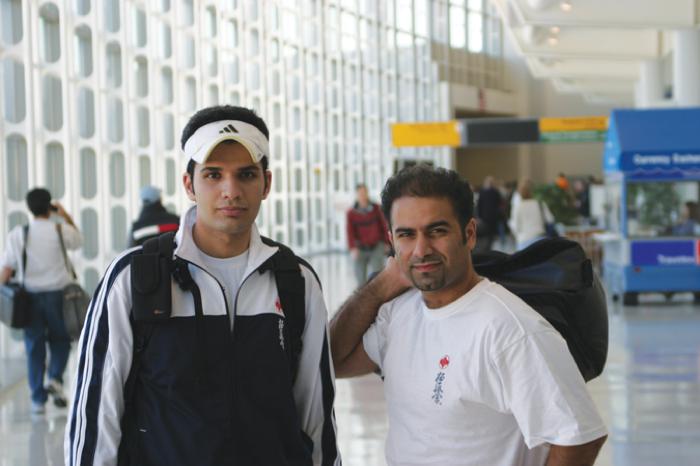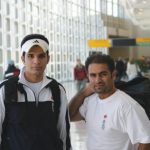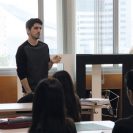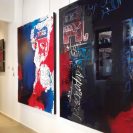Abdullah Boushahri stood in the corner of the conference room, anxious with anticipation. It was the 20th annual National Union of Kuwait Students-USA conference, and his short documentary Kuwaiti Champion was about to be shown. He rested his chin on the space between his forefinger and thumb, and gazed out to the audience that had walked out on a major production film the day before. No one had seen the documentary, Boushahri shot and edited the whole thing on his own, and he had no idea how it would be received. It was his first of many moments of anticipation in the dark, waiting for his project to work its magic, and hoping the audience would be enchanted by it.
“I like to stand and watch the audience because in a dark room no one is forcing you to laugh, it’s just you and the movie,” he told bazaar. “I stand, as quiet as I can and try to listen to their whispering, to their laughter and their emotions and wonder, can I really move this guy? That moment where you feel that you’ve achieved moving a human emotion I think is very sophisticated and very pure.”
In 25 minutes the audience was taken on the incredible journey of Yousef Al-Saleh, a karate fighter, as he trained and fought his way to the US open, and the Kuwaiti filmmaker that captured every drop of sweat, tears and smile through the process. When the lights came on, Boushahri watched his brother and Al-Saleh embrace in a tearful hug, and 600 people in the audience stood up to give him his first standing ovation.
They crowded around the director to give their congratulations. They were moved by the idea of a Kuwaiti with a dream, and the guts to go for it. He stayed up with them in the hotel lobby until daybreak and discussed parts, like the scene where Al-Saleh used the Kuwaiti flag to cover tears during a fight, and the journey, he as the filmmaker, shared with his subject. Yet, it was the cultural attaché of Kuwait, Dr. Mirza Hassan’s quick congratulations that stood out to him most. At the time, Boushahri was studying cinema and film at Florida Atlantic University, without a scholarship due to a restriction of Kuwaiti students to the traditional majors of science and engineering.
“Right after the screening he walks up to me, shakes my hand and says ‘I am very sure of how important cinema is right now. Congratulations on this, I am going back to the office Monday and sending my recommendation to include cinema as an approved major.’ The next semester they had a scholarship for cinema,” said Boushahri.
His exceptional work showcases talent highlighted by the passion he holds for telling an incredible story, and an ode to his never ending search for the perfect plot. His first feature film Losing Ahmed, under his production company Beyond Dreams, started on the second leg of a British Airways flight from Miami to Kuwait. He struck up a conversation with two women headed to his homeland for a NGO project to assist Iraqi children disabled in the war. This trip was aimed at retrieving Ahmed, a young boy who had lost his sight and right arm in a bomb dropped by the US army and intended for terrorists. Boushahri’s story radar was on high alert, and with their permission began filming right there in the airplane. He traveled with them to the Iraqi border, met the young boy and captured the incredible friendship that became the first part of the film.
Less than a week later Boushahri was back on a plane headed to New York City with his new friend to film medical treatments to restore his eyesight, and a prosthetic for his arm. During the flight he uncovered the NGO’s ulterior motives of making Ahmed a poster child to boost funds, and refused to give them his footage. When they arrived in JFK, he waited for hours in the arrivals hall for Ahmed to come out of immigration in vain. For the next year Boushahri searched for and tracked down Ahmed and his father in the small home the NGO had set them up in. The story reaches a climax as Boushahri drives through the snow searching for a home the blind Ahmed had described to him as between a church and a school.
Losing Ahmed won best documentary awards at both the Emirates Film Competition and the Golden Minbar Film Festival in Russia. Boushahri’s career has been peppered with firsts, first Kuwaiti filmmaker to enter the Emirate Film Competition, the Dubai International Film Festival and the Singapore Film Festival and first Kuwaiti to participate as a judge in the Dubai Film Festival to name a few. He has continued to evolve as a filmmaker, adding visual effects and animation to his resume with his company Synq Studios, a Miami based post-production house that has worked on effects for films like Battle L.A, Resident Evil and Harry Potter, and became the director behind the Burj Khalifa documentary Burj Dubai, a story of how to make the impossible possible.
Boushahri is not one to boast, nor will he give any sweeping eulogies on the importance of his work. This humble filmmaker focuses on telling good stories, and hopes the younger generation is propelled to do better when they see his successes. Until then, he continues to travel around the world, depositing images and plot lines in his visual memory and searching for the next treasure of a story in the sea of human experiences.
bazaar questionnaire:
What do you most value in your friends?
Trust.
What is your idea of perfect happiness?
Success.
What is your greatest fear?
Loss of loved ones, especially family.
What is the trait you most deplore in others?
Ego.
Which living person do you most admire?
My father, Abdulrasoul Salman.
What is your greatest extravagance?
Travel.
Which words or phrases do you most overuse?
“Am not sure!”
What is it that you most dislike?
Negativity.
Which talent would you most like to have?
To speak many languages.
If you could have any job, what would it be?
Run a music academy.
What would you consider your greatest achievement?
Waking up very early in the morning.
What is your most treasured possession?
My family.
What is your most marked characteristic?
Dynamic.
Where would you most like to live?
Miami.
What are your favorite words to live by?
Never give up.
Connect with Abdullah Boushahri on Instagram or on Twitter.












